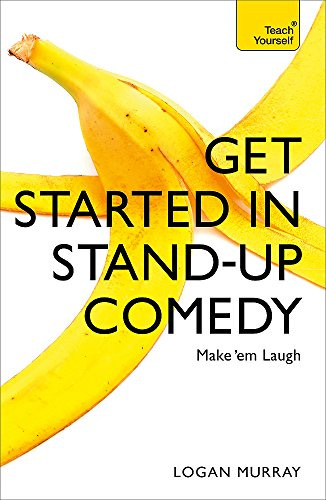I first heard the term “afterthought” coined by Logan Murray in his fantastic book Getting Started In Stand Up Comedy. In fact much of my earlier classes were lifted verbatim from this book, before I started to do my own thing.
Afterthoughts are almost always the reason why we laugh at a comedian’s routine. If the first thought is the set-up, the afterthought can be seen as the punchline. The afterthought is the line that supplies the other half of the joke equation.
Logan Murray
You may think “Ah, finally we’re going to find out how to write punchlines!” but I think punchline is an old fashioned term, it’s usually accompanied by a rim-shot and an instruction to tip your waitress. A punchline is old fashioned to me, because it implies it’s the funniest part of a joke, and also the end of it. There’s something about how a comedian sets up a punchline that gets your whole body ready to laugh. And you do laugh, but it’s less of a laugh because we weren’t as surprised. A good afterthought should completely blindside it’s audience. The best way to do that is to use your normal way of speaking.
Stay in the joke
I sometimes get people coming to my beginners class who have already been doing comedy for a while - they are sometimes the worst at doing authenticity exercises, because they already know how to write “jokes”. They bail out of an authenticity exercise after one mediocre punchline, and never “stay in the joke”. A good joke is looked at from all angles, it’s rinsed and kicked and pissed on until it’s a lifeless husk and everyone screaming “HE’S ALREADY DEAD”. And just when the crowd starts to thin and dusk falls and the owls start hooting, the bloody thing splutters to life again! Eyeballs detached from retinas, guts hanging out, and covered in its own shit piss and vomit, leaving what’s left of the horror struck crowd to say “Why, why must it live? and why must we witness it? Can’t something be done to ebb this horror?”.
Now THAT’S a good joke!
I’m not denying the existence of good one liners, but that’s an end game. You should always try and write as many afterthoughts as you can. The really good stuff is always hiding behind the “first thought” stuff, and it’s a long way behind the “second thought” stuff.
Third Thought
Third thought is one step removed. It’s something that you never would have thought of, and that’s where the best jokes lie
Anthony Jeselnik from this article
Afterthought to me means keep going with the joke. Keep going and finding funny things to say and new directions to go in.
A good joke shouldn’t just make you laugh, it should make you feel like you are sharing the same world as the comedian who is telling the joke.
If you add an afterthought to an initial thought and the audience laughs, then you have written a joke; but if you add another afterthought to that first one, then qualify that thought with another afterthought, before making an editorial point to that afterthought, before clarifying your thought one degree further, then you are well on your way to writing a routine.
Logan Murray
Here are some ways to write afterthoughts:
Opposite opinion
If you have a specific opinion such as “Homophobia is bad” then imagine if it was good. Not a fan of this guy any more but this is just a great example.Amplify the attitude
Nobody does it better than Maria Bamford! So much going on in this bit, but where she says People Magazine is her religion is a great example.Explore all points of view
Your point of view isn’t the only point of view - although it’s probably the only correct one. See things from other peoples points of view. Whether it’s saying what the audience is thinking or the other characters in your story. Nate Bargatze is excellent at afterthoughts. Among other techniques he often says what the other people in his stories are saying.Give examples and use metaphor and act-outs
if you’re talking about something specific, it can be a good idea to give examples so the audience can relate to it more.Be more authentic
Notice when you’re pulling away from an idea because it’s getting “too real”. Maybe you’re actually being pretentious about something because you want to be more likeable. Catch yourself in that act and make that an afterthought.Change the context
What id this bit was happening 1000 years ago, what if aliens were trying to understand it, what if it was happening in the future, in another country. Try and find a scenario to move your idea to that heightens the premise
Stay in the joke
There’s probably more to this joke that you haven’t explored. Keep going!
Tomorrow I’ll post one of my many afterthought exercises that will hopefully illustrate this topic even further, and help you expand your own material.






